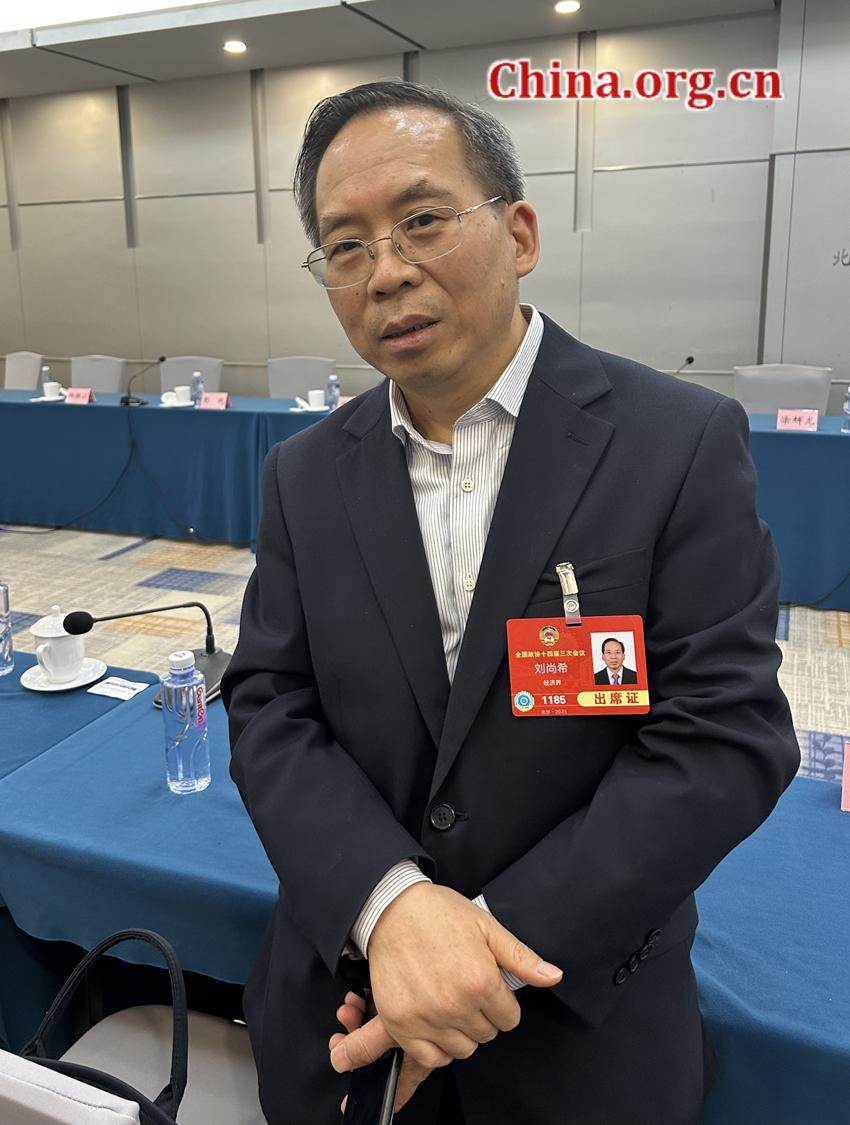
 0 Comment(s)
0 Comment(s) Print
Print E-mail China.org.cn, March 9, 2025
E-mail China.org.cn, March 9, 2025A national political advisor said China should leverage its stability to address global economic and trade uncertainties.

Liu Shangxi, former president of the Chinese Academy of Fiscal Sciences and a member of the 14th National Committee of the Chinese People's Political Consultative Conference (CPPCC), speaks to China.org.cn during the annual session of the top political advisory body in Beijing, March 6, 2025. [Photo by Zhang Rui/China.org.cn]
Liu Shangxi, former president of the Chinese Academy of Fiscal Sciences and a member of the 14th National Committee of the Chinese People's Political Consultative Conference (CPPCC), said the current foreign trade situation should not be viewed optimistically due to growing uncertainties, which he linked directly to U.S. President Donald Trump.
"Trump is intentionally creating this uncertainty himself," Liu said. "He is reshaping the global order and continuously changing the rules, which has profoundly impacted the world's economic and trade investments, as well as international cooperation."
The U.S. recently moved to impose additional tariffs on Chinese goods, prompting China to take countermeasures. At a press conference Friday, Foreign Minister Wang Yi urged the U.S. to reassess its trade wars, questioning whether they have narrowed the trade deficit, strengthened manufacturing competitiveness, controlled inflation or improved American lives.
"We need the market, enterprises and the government to face the challenges together, working in their respective areas but with coordination," Liu said, emphasizing China's strong internal circulation. "As often said, we must use China's own certainty to respond to the uncertainties of the international community."
Liu told China.org.cn that one of China's critical issues is upgrading consumption during industrial transformation. "We must consider both supply and demand together and understand their relationship from the perspective of a cycle," he said. "One-sided industrial upgrading may lead to a disconnect between supply and demand, resulting in inefficient economic circulation. This would reduce efficiency, increase costs and ultimately affect employment."
Liu continued: "Macro policies should be more proactive and people-oriented. The aim is to address structural issues that have accumulated over time. Resolving these challenges will smooth economic circulation and naturally strengthen growth momentum. However, solving these structural issues cannot be achieved overnight. It will require a process involving both macro policies and reforms."
In an interview with the media on March 6, Liu explained that raising the deficit ratio, expanding debt and increasing government spending are essential steps to boost national income levels. He said a higher deficit ratio enhances the countercyclical capacity of fiscal policy, reflecting a more proactive and sustained fiscal approach.
China has set a record deficit-to-GDP ratio of about 4% and plans to issue 1.3 trillion yuan ($179 billion) in ultra-long-term special treasury bonds in 2025, signaling a strong fiscal push to drive growth. These measures were outlined in the government work report delivered by Premier Li Qiang at the opening meeting of the third session of the 14th National People's Congress in Beijing on March 5.